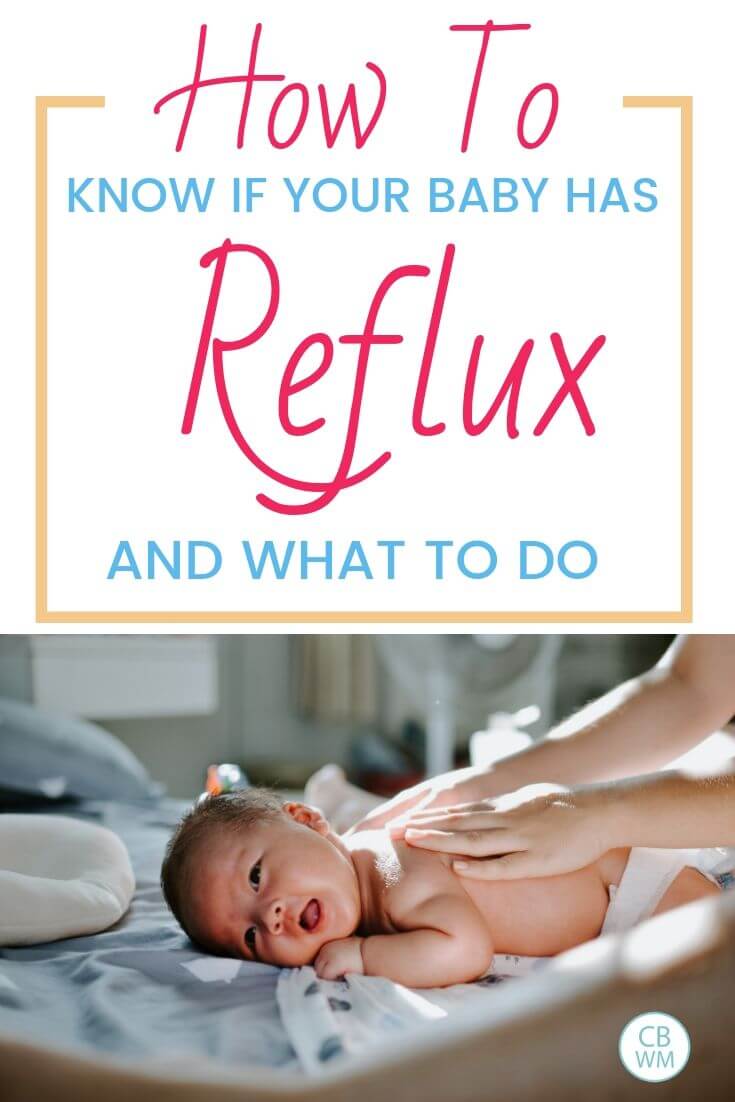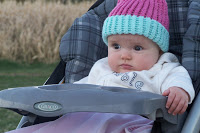How to know if your baby has reflux along with common symptoms of reflux. Get tips on treating reflux and know what to do and what not to do.

In The Baby Whisperer Solves All Your Problems, Tracy Hogg discusses reflux. This post includes information from the book as well as my own added thoughts since Kaitlyn had reflux.
Post Contents
WHAT IS REFLUX?
page 111
Reflux is basically heartburn. The sphincter in the esophagus is immature and doesn’t close properly. This causes food to come back up. With food comes stomach acid, which causes burning. If you have ever had heartburn, you know how uncomfortable this is. Imagine having it at all times.
Read: Babywise and Reflux
HOW DO YOU KNOW IF BABY HAS REFLUX?
page 111
Reflux can be tricky to diagnose in the beginning. The symptoms and reactions vary in babies. Plus, babies spit up. Spitting up even after every meal is normal for a baby without reflux.
These factors increase the likelihood for reflux:
- Baby was breach
- Baby had cord wrapped around neck during delivery
- Baby was premature
- Baby was jaundiced
- Baby was low-birth weight
- Baby was delivered via c-section
- Baby has a family history of reflux
Here is a list of symptoms for babies with reflux. Baby will not necessarily have all of these:
- Baby has a hard time eating a full feeding
- Baby might sputter and choke
- Baby might spit up or projectile-vomit a few minutes after eating
- Baby might spit up as long as an hour after a feeding
- Baby might have explosive poops (but most babies do 🙂 )
- Baby might be hard to burp
- Baby is only content (or most content) in an upright position
- Baby screams when put in a flat position
- Baby does not need to spit up in order to have reflux. This is called silent reflux.

HOW DO YOU TREAT REFLUX?
Do Not
- Jiggle baby. This can move acid up into the esophagus.
- Burp too roughly. Again, this can move acid up the esophagus.
- Avoid burping. Trapped gas in the tummy does not help baby feel better.
Do (page 113)
- See your doctor. While reflux is getting to be more understood, it is still highly misunderstood and surrounded with many myths. If your doctor doesn’t think it is reflux but you do, get a second opinion. You can see a pediatric gastroenterologist.
- Elevate Mattress. This is the Crib Wedge we used. I put it under the mattress. You could also try extra blankets under the mattress. I also used this Sleep Positioner to help keep Kaitlyn in place. One of my best friends used this Sleep Positioner/Wedge Combo for her baby with reflux. I borrowed it and tried it with Kaitlyn. It worked well, but it made Kaitlyn really hot. She hated to be hot (she even hated wearing socks), so it didn’t work for us. It would have been great for McKenna. If your baby has severe reflux, you might need something more elevated. See Crib Wedges on Amazon to see the different options out there.
- Burp Gently. Patting can create spit up. Hogg suggests you rub the left side of his back in a circular motion.
- Watch Feeds. Avoid overfeeding. If baby is fussy after a feed (common in the reflux baby), try using a pacifier to soothe–especially if you are bottle feeding. Many reflux babies find sucking comforting.
- Solids. Hogg says to not give solids sooner than 6 months with the reflux baby. She doesn’t think it helps. I, however, found it did help with Kaitlyn. I know moms who say it did help and those who say it didn’t. I think this is a matter best discussed with your baby’s doctor.
- Hang In There! Many babies start to improve around 4 months of age. 8 months is another milestone. Most are done with reflux by one year of age, though some do continue beyond that.
- Consider Meds. See section below.
Read: How To Help Your Reflux Baby Sleep
MY EXPERIENCE WITH REFLUX
When Brayden was a baby, he spit up a total of two times his entire first year of life. Seriously. Reflux was definitely never considered with him.
Kaitlyn had reflux. I don’t know if I would have caught it myself, at least for a while. She had silent reflux. She obviously spit up a lot, but almost always swallowed it down. Sometimes she worked so hard to keep it down it ended up coming out of her nose. She never cried. She always handled it well. Kaitlyn was in the NICU when first born (turned out there was nothing wrong with her). The nurses there caught it. Kaitlyn’s reflux started to improve around 4 months, but she was not able to go off meds until she was one year old.
When McKenna was born, I was naturally worried we would have another baby with reflux. I watched her closely. She spit up a lot. I only had Brayden and Kaitlyn to compare, so I wondered if she had reflux. One of my nurses told me it is hard to tell at such a young age because newborns are so “spitty” anyway.
As she got a bit older (1-2 weeks), the spitting up improved rather than getting worse. She got to the point that I didn’t even use a burp rag anymore. So I knew she didn’t have reflux.

MEDICATION and REFLUX
My personal opinion is that if your baby has reflux, give her medication for it. I am not one who likes medication. I avoid taking it at all costs. I never take it when I have a headache. I don’t take it while pregnant. I even avoid taking it while recovering from delivery. I save medication for severe, intense-need situations (I did use it after Brayden). But I think if a baby has reflux, you should put her on meds.
First, consider how painful heartburn is. I get it when I am pregnant. It is not fun. You can’t eat. You can’t sleep. You can’t sit, lay, etc. Everything is uncomfortable.
Second, realize that stomach acid burning the esophagus repeatedly can cause long-term damage. Kaitlyn didn’t show any real pain with her reflux, but I didn’t want her to burn her esophagus over and over all day and night.
I believe that there is a history of undiagnosed reflux on my husband’s side of the family. Both his grandfather and his older sister have major throat issues. They have to get their throats stretched every so often or they start to choke on food. Not just a little sputter–cut off your airway choke.
When Kaitlyn was a newborn, a woman who lives down the street from me told me that her then 18 year old son had silent reflux as a baby and child and they didn’t know it. When he was seven, he started choking on food. It turned out that the acid had caused such damage to his throat that he needed to get it stretched at least once a year for the rest of his life. She told me to watch Kaitlyn closely.
I understand the desire to avoid unnecessary medication, but when it comes to reflux, my personal opinion is that medication is necessary. Do your research. Pray. Consult with your doctor. Make a decision for your child.
Kaitlyn’s doctor didn’t want to put Kaitlyn on medication since she was growing and wasn’t in pain. This is a common thought in the medical community. He is a great doctor, though, and really respects me as the mother. I told him I really wanted her on medication. I had research and talked with my friend about reflux. I felt meds was the best option. He put her on prevacid.
There are a lot of options out there for medicine. Be aware that most of them are weight-dependent. So as your baby grows, if she starts to get aggravated symptoms, she might need her dosage increased.
Kaitlyn never had her dosage increased after 3 months old. Her reflux improved enough that as she grew, the dosage was sufficient to manage the reflux.
If you do get prevacid, to to the Prevacid website to get a coupon for the medication. I wish I had known about it while Kaitlyn was on it!
